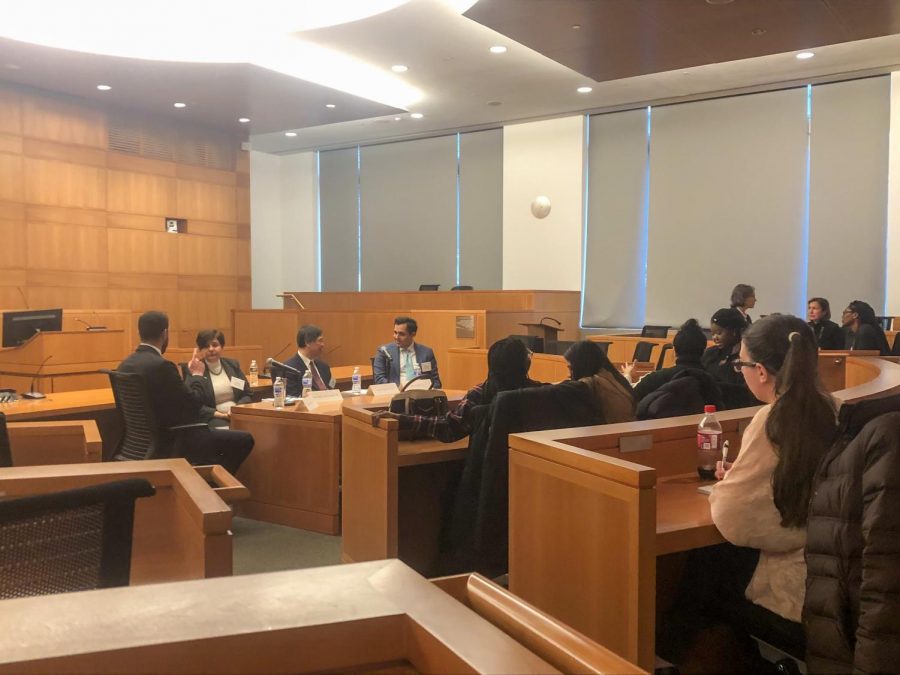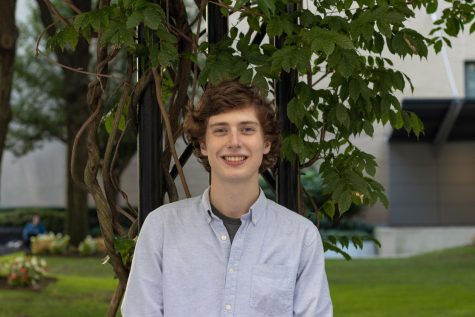Fordham Law Recognizes First-Generation Students and Alumni
The Honorable Maria Araujo Kahn ’89 (center-left) and Denny Chin ’78 (center-right) share their experiences before an audience of first-generation students and alumni in the Gorman Moot Courtroom.
February 19, 2020
Fordham School of Law (LAW) hosted a panel of two first-generation judges and Fordham alumni to honor immigrant legal professionals. Students and alumni from Fordham School of Law, some of them first-generation immigrants themselves, gathered in the Gorman Moot Courtroom on the evening of Feb. 13 to hear the Honorable Denny Chin, LAW ’78, and Justice Maria Araujo Kahn, LAW ’89, talk about their experiences as immigrants in the United States.
Chin’s grandfather first came to the United States illegally to work in 1916, when the Chinese Exclusion Act barred nearly all Chinese immigration into the country. In 1946, Chin’s grandfather became a U.S. citizen and was able to bring the rest of his family to New York in 1956. Chin arrived in the U.S. when he was only two years old.
Chin credits his parents for instilling a hard work ethic within him, which he said was crucial in his studies and career. “We worked hard and did well in school, and that was, I think, the key to my success,” Chin said.
Kahn was born in Angola, where her father sold shoemaking supplies. Kahn and her family lived in the capital of Luanda until they were forced to flee Angola when she was 10 years old in 1975 due to the Angolan Civil War. Her family chose the United States since her mother’s brother had citizenship, and immigration laws at the time gave top priority to refugees fleeing civil conflict.
Both Chin and Kahn talked about the language barrier that they and their families experienced. Neither Chin nor Kahn’s parents could pay for their children’s education, and both worked throughout their time in school.
“My parents didn’t speak English. My father was a cook in Chinese restaurants and my mother was a seamstress in garment factories in Chinatown,” Chin said.
Kahn’s parents also struggled. Only knowing their native Portuguese, they had to work in factories. She eventually learned English and acted as a translator for her family. “I knew what it was like to not speak the language, and I saw the impact it had on my family,” Kahn said.
Another difficulty that both judges said they faced was a lack of guidance from their parents. “Some of my classmates here had parents who were in the law (industry) and they could get a lot of guidance and assistance, and I felt at times I had a disadvantage,” Kahn said.
Kahn earned her Juris Doctor (J.D.) at Fordham School of Law in 1989 and is the first-ever recipient of the Noreen E. McNamara, LAW ’51, Memorial Endowed Scholarship.
Kahn and Chin talked about the help and guidance that their professors gave them as they found their way through law school.
When giving advice to students, both judges highly recommended that law students apply for clerkships. Law clerks typically assist judges in making decisions and legal opinions. Chin saw clerking as an effective way of building relationships with judges and getting firsthand experience working on legal cases. “You’re learning about how the justice system works — you’re part of the administration of justice,” Chin said.
Kahn encouraged students to explore their own interests and passions while also making sure not to lose sight of other opportunities. “Always pick opportunities that keep open more doors than closing them,” Kahn advised the crowd, assuring students that any experience they gain in their legal careers will only help them.
“There have been times in my career where I have wound up in positions where I’d thought, ‘This isn’t where I envisioned myself being in, I’m at a dead-end,’ or at least that’s what I’d perceived. Every experience I had turned out to help me when I was applying to become a judge,” Kahn said.
The panel then opened up to answer questions from the audience before transitioning to a catered reception in the Constantino Room on the second floor of the law school. Attendees and judges chatted and mingled among themselves for an hour, discussing the event and practicing their networking skills.
Attendees, many of whom were also first-generation immigrants, said they felt supported and inspired by the judges’ stories. Mahnoor Misbah, LAW ’18 and first-generation immigrant from Pakistan, found that the judges’ recommendation of clerking resonated with her, as she is currently working as a law clerk. “I always want to deliver the best writing,” she said, feeling encouraged that the judges had also practiced clerking in their careers.
Chris Mensa, LAW ’18, also enjoyed the panel. “I think it was a very inspiring event; having a vision for the future is very comforting,” he said.













